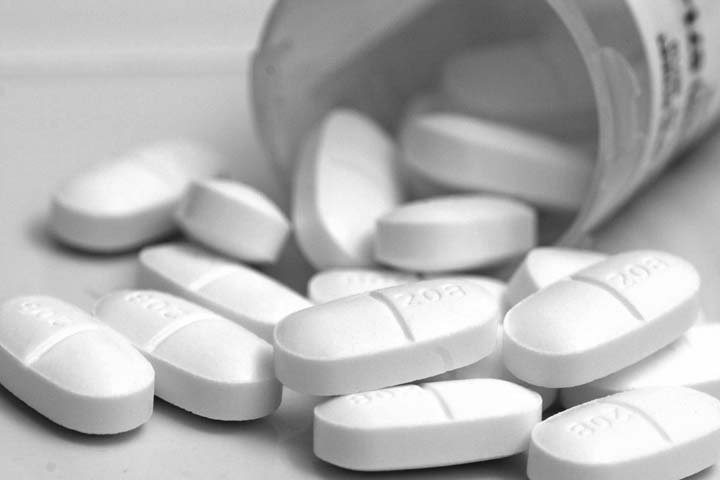There has been a scare in the media over whether patients with coronavirus may get worse if they use ibuprofen for a fever. At this point, those fears to not appear to be justified.
Probably the first reference to this issue was published in a March 11 non-peer reviewed letter to the Lancet from Lei Fang, George Karakiulakis, and Michael Roth suggesting that patients with hypertension or diabetes may be at increased risk for COVID-19.
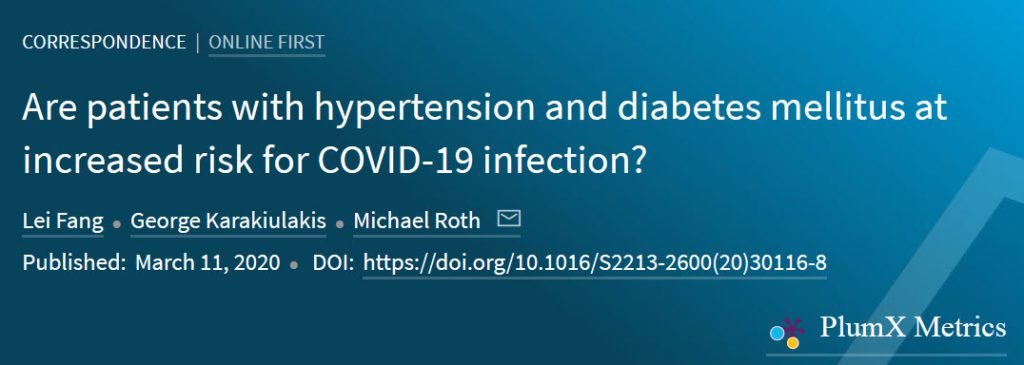
Again, this was not a peer-reviewed article. According to the letter, SARS-type coronaviruses bind to cells through angiotensin-converting enzyme 2 (ACE2) which is contained in cells of the lung, intestine, kidney, and blood vessels. Certain medications increase the amount of ACE2 enzyme in the system including ACE inhibitors, angiotensin receptor blockers or “ARBs,” diabetic medications called thiazolidinediones (such as Avandia and Actose) and ibuprofen. The letter created an untested hypothesis that patients treated with these medications are at increased risk of “developing severe and fatal COVID-19.” The letter acknowledged that that the theory was unproven, stating that “if this hypothesis were to be confirmed …” it could lead to a conflict in treatments of COVID patients for hypertension and diabetes.
Shortly afterward, there was a report circulating on the social media app “WhatsApp” of an unknown infectious disease doctor in Toulouse, France who reportedly cited four cases of young patients with COVID-19 infections who developed “serious symptoms” after using non-steroidal anti-inflammatory drugs for early COVID symptoms. While the internet is replete with references to this physician’s allegations, multiple searches of medical databases and tweets could not find this physician’s actual report or the “serious symptoms” that his or her patients developed.
This WhatsApp message then morphed into young people in serious condition at other ICUs in Europe after using ibuprofen, including Cork University Hospital in Ireland. Ireland’s HSE Chief Clinical Officer Colm Henry quickly debunked this misinformation, telling TheJournal.ie that such reports were “complete lies and totally untrue.”
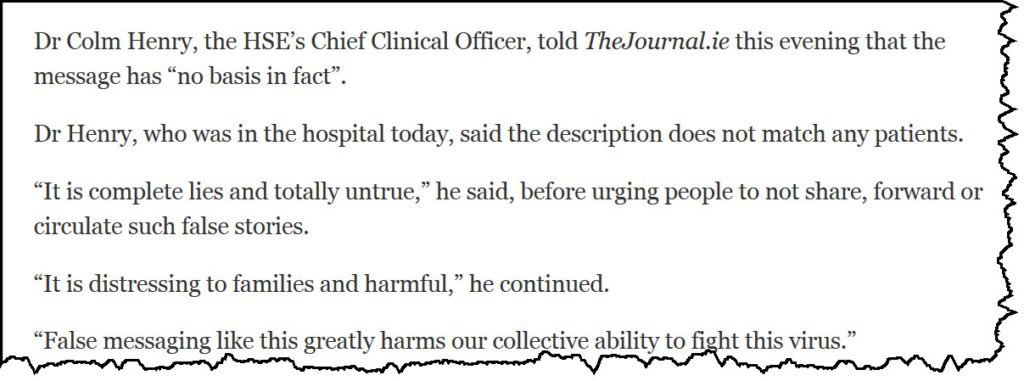
On March 14, 2020, French Health Minister Olivier Veran tweeted that “anti-inflammatories may be a factor in aggravating [a COVID-19] infection” and that “in case of fever, take paracetamol (acetaminophen).” That tweet quickly went viral, currently with more than 43,000 retweets and 40,000 likes.
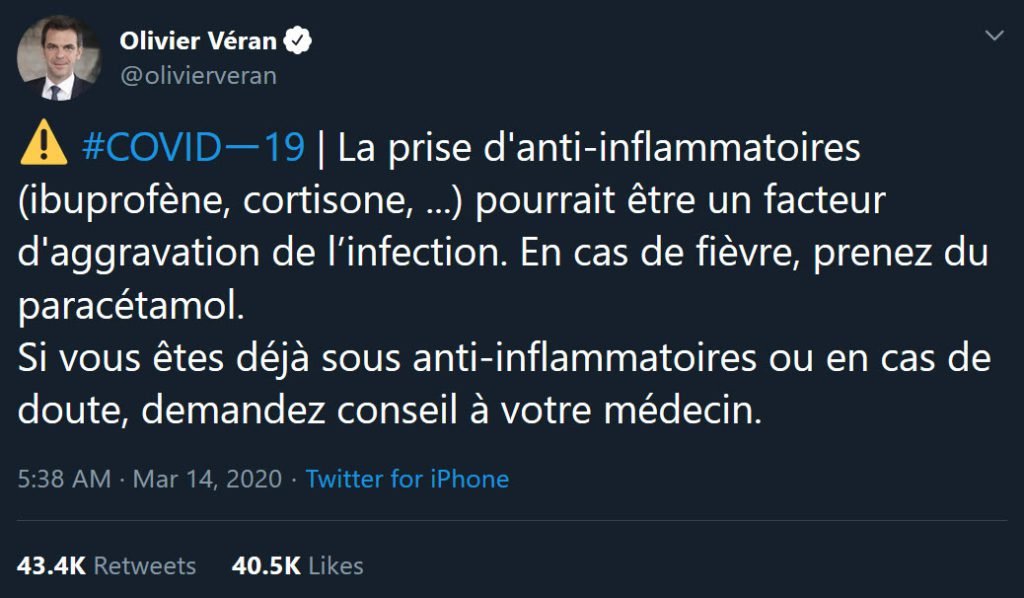
This tweet led to newspaper articles expanding on the warning, such as this March 14, 2020 article in the Guardian stating “Anti-inflammatories may aggravate Covid-19, France advises.”
On March 17 an article by Michael Day in the BMJ recommended against ibuprofen use in COVID infections. This article also referenced the case of the four patients with “serious symptoms” without any supporting citations. Mr. Day’s article added opinions from several experts who made rather noncommittal statements such as ” prolonged illness or the complications of respiratory infections may be more common when NSAIDs are used” and “for COVID-19, research is needed into the effects of specific NSAIDs … [but] for treating symptoms such as fever and sore throat, it seems sensible to stick to paracetamol as first choice.” There was no additional study data or case reports on ibuprofen use with COVID patients. Several comments to this article criticized the BMJ for publishing the article and criticized the article’s conclusions for “poor research methodology,” a “lack of evidence,” and needing “better information.”
The New York Times then published an article on March 17, 2020 in which some experts questioned whether patients with fever should be treated at all, quoting one infectious disease expert as saying “taking a drug to reduce fever can lead to longer periods when people are infectious” and it “might be reasonable … to avoid both [acetaminophen AND ibuprofen].”
On March 18, 2020, the World Health Organization tweeted that it did not recommend against using ibuprofen” in treatment of COVID-19.
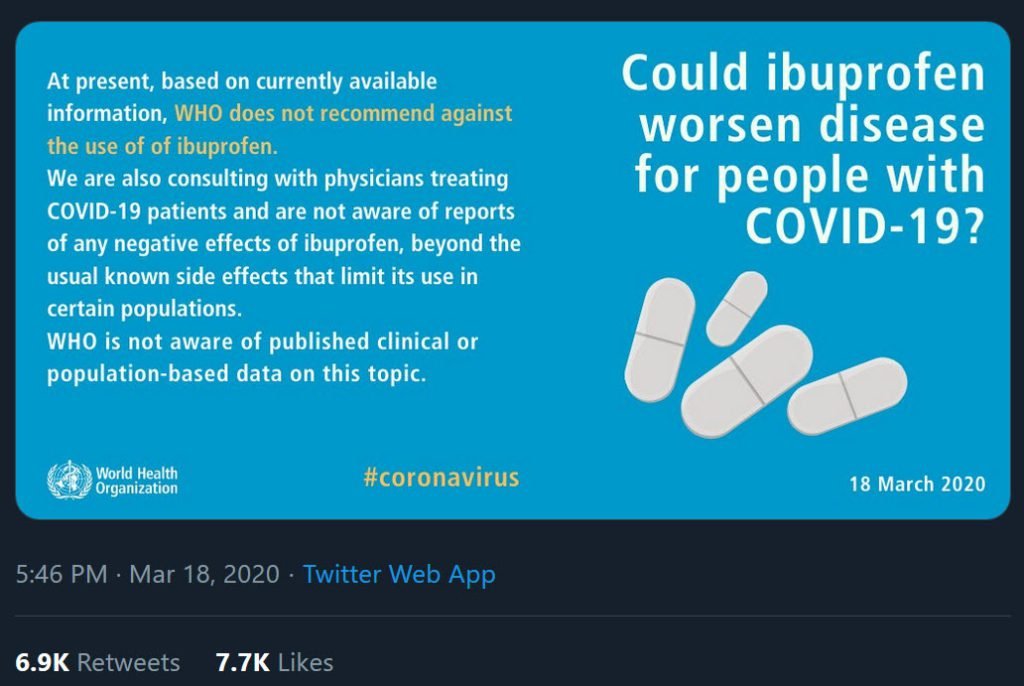
Since then, news articles have been more balanced in their approach.
On March 19, 2020, the Boston Globe noted that the WHO was “walking back” its warning about ibuprofen and coronavirus. Live Science noted that “There’s a lot of speculation but very little data to say one way or another,” and the European Medicines Agency stated that there is “no scientific evidence establishing a link between ibuprofen and worsening of COVID-19.“
Summary
There’s simply no evidence at this time for an allegation that ibuprofen worsens COVID-19. The meme started with a non-peer reviewed letter to a journal then was fueled by several untrue posts on social media which were reposted without further investigation.
This isn’t to say that there may never be a causal connection established between NSAIDS and worsening of COVID-19 or other viral infections, only that current data in the scientific community does not establish that connection.
From a legal standpoint, the management of a pandemic novel virus is new to everyone. Treatment protocols will evolve with time. It would be difficult to fault any medical provider who follows guidelines from the World Health Organization or the Centers for Disease Control, realizing that guidelines change. We should all try to stay vigilant for significant changes in recommendation for coronavirus management.
